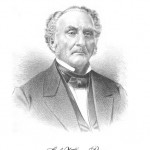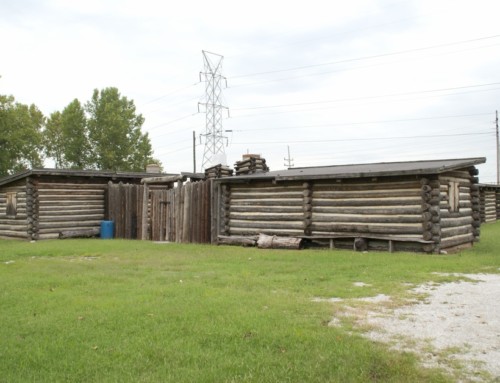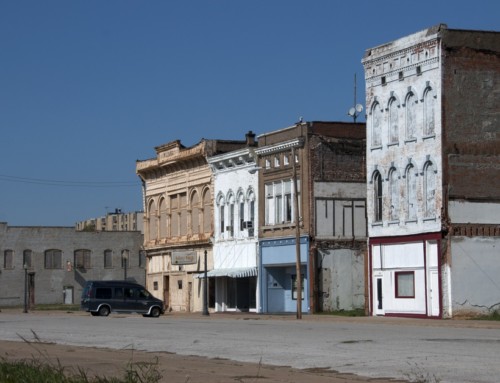Introduction
Atlas is the oldest community in Pike County, founded in 1823 by Colonel William Ross, the same year it was chosen as the county seat, which was also the same year its fortunes peaked.
Visitor Information
Get your questions answered from the folks at the Pike County Chamber of Commerce (217.285.2971).
History
The Ross family arrived here from Pittsfield, Massachusetts in 1820 and ended up building their homes about where the village of Atlas is today. The clan included Colonel William Ross, Captain Leonard Ross, Dr. Henry Ross, and Clarendon Ross, all married and with families in tow.
For reasons that should be obvious, the site was first known as Ross’s Landing, but when the village was platted, William Ross and Rufus Brown chose Atlas as the name. It’s not entirely clear why, but there’s an old story in the Ross family that once they reached their new home, they were extremely worn out, and someone in the family exclaimed “home, at last.” That expression of relief was then turned into the name Atlas.
Like the Ross family, Ebenezer Franklin moved to the area in 1820, living in a tent with his family for a little while. Daniel Shinn, like Franklin, came in the spring and also pitched a tent for his family. Both men got around to building log cabins when the weather warmed up. Most of the early Europeans who put down roots in the township came from the Northeast (New York and Massachusetts, primarily), like the Rosses.
Before the bottoms were cut off from the river by the Sny levee, Atlas could be reached by boat through Sny Carte Slough. Living in the bottoms had its downside, though. In the summer of 1821, a lot of early settlers died from disease, probably malaria, including the wife of William Ross.
Atlas was on the winning side of an early battle for county seat. The clash pitted John Shaw, an early kingmaker, against the upstarts at Atlas. Shaw was infamous in the area as a powerbroker; folks called him The Black Prince. He won the first round, getting the county seat at his community, Cole’s Grove in 1821, but two years later, as the county’s growing population diluted Shaw’s influence, the legislature voted to move the county seat to Atlas.
Shaw didn’t give up, though. In 1825, as vast Pike County was being split up into several, more manageable counties (over 50!), Shaw convinced the legislature to lop off the southern portion of Pike County to create Calhoun County. Cole’s Grove was then renamed Gilead and christened the seat of the new county. Shaw stuck around for a couple more decades, farming and founding the village of Hamburg. Sometime in the early 1840s, though, Shaw boarded a steamboat that he owned and named in honor of himself, headed downriver and never looked back.
Even with the county seat, Atlas was far from a boom town. It wasn’t in an especially advantageous location, on the western edge of the county and not far from much larger cities (Quincy and Louisiana, Missouri). It also lacked the easy water access of Rockport, although it got all the benefits of being near a swamp, like an abundance of mosquitoes and occasional outbreaks of disease.
In March of 1823, county commissioners licensed a tavern in Atlas to Rufus Brown. Like the ferry operator, Brown had to agree to a very specific set of rates: 25 cents per meal; 37 ½ cents per night for horse keeping; 12 ½ cents per night for human keeping (overnight lodging); 12 ½ cents for a half pint of whiskey; 25 cents for a half pint of rum or gin; 50 cents for a half pint of French brandy; 37 ½ cents for a half pint of wine. Brown would also establish the first tavern in Quincy.
As Pike County grew, residents and officials realized that a more central location for the county seat would serve their needs better, so in 1833 commissioners approved moving it to newly established Pittsfield. William Ross knew what was coming and apparently went with the flow. He loaned money to the county so they could buy the land to plat Pittsfield. In return, he got to name the new village, so he chose the name of the place he had left in Massachusetts. Atlas lost its mojo after that, as many businesses and residents moved on. Even William Ross eventually moved to Pittsfield. By 1880, Atlas was little more than a few houses with a post office, a general store, and a blacksmith.
Most of the land around Atlas was farmed, especially after the levee was built. Even with the levee, though, the land still wants to be wet. Jon Payne, who grew up in Atlas Township, wrote:
The land where we lived was soggy, swampy, marshy. I thought it unremarkable that each spring brought the threat of a nearby river—in our case, the Mississippi River—flooding where people lived and farmed…I assumed that most people everywhere had, as we did, water over the local roads in spring.
One Boy’s Pike County; Jon Payne; 2011; p. 18
Atlas today consists of just a handful of houses at the intersection of two main roads. One of those houses, though, dates to the town’s early days, to 1823; it is still a private home today.
Entertainment and Events
Festivals
Atlas is one of the communities that participates in the Pike County Fall Pickin’ Days, a chance to enjoy fall color and support local vendors in small towns as you drive around the countryside. Each community offers something a little different for visitors (October).
**Looking for more places to visit along the Mississippi River? Check out Road Tripping Along the Great River Road, Vol. 1. Click the link above for more. Disclosure: This website may be compensated for linking to other sites or for sales of products we link to.
Where to Go Next
Heading upriver? Check out Rockport.
Heading downriver? Check out Pleasant Hill.
Or, detour west to Pike Station.
Community-supported writing
If you like the content at the Mississippi Valley Traveler, please consider showing your support by making a one-time contribution or by subscribing through Patreon. Book sales don’t fully cover my costs, and I don’t have deep corporate pockets bankrolling my work. I’m a freelance writer bringing you stories about life along the Mississippi River. I need your help to keep this going. Every dollar you contribute makes it possible for me to continue sharing stories about America’s Greatest River!
©Dean Klinkenberg, 2016






